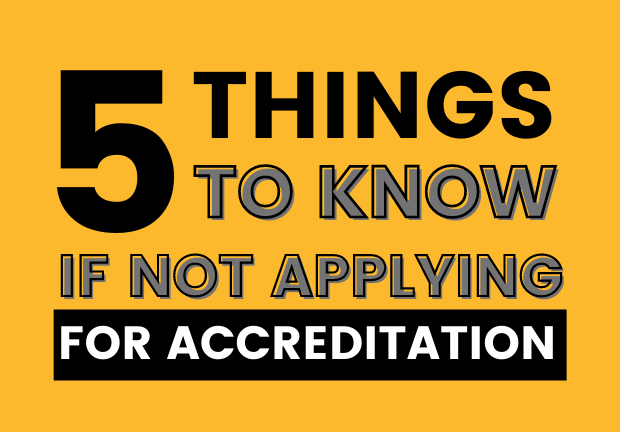4 things to know before applying for INZ Employer Accreditation in 2023
12 July 2023You would have heard by now that a completely new scheme is being introduced to employers who wish to support migrant workers.
Any employer that wants to support a migrant worker from July 4, 2022, onwards will only be able to do so if they are accredited under the new system. From 2024, an INZ business accreditation will be compulsory if the employer wants to hire any migrants, even those on open work rights, but the government is yet to release more information about it.
To gain a new accreditation you’ll need to complete three stages of the process, with applications for the first stage - Employer Accreditation, opening on May 23, 2022.
We’ve put together some useful tips on what you need to consider as an employer before applying.
[1] Determine if you need to be accredited
First, you should figure out if you need to be accredited. If yes, you’ll need to decide under what category, which is explained further in the article.
Do these three things first:
Step 1: Find out how many team members are already on work visas, how many will need your support on/after July 4, 2022, and if you need to hire more migrants after that date.
Step 2: Calculate how many people will require Accredited Employer Work Visa (AEWV) because the accreditation requirements and costs may vary depending on the number of migrant workers you intend to hire.
Step 3: If all your migrant workers have visas to last them another one to three years and you’re not planning to hire more migrants in the next year, then you don’t need to get accredited yet. However, keep abreast of your recruitment forecast so you are prepared to submit an accreditation application when its time.
Note: Starting from November 2023, the government plans to roll out a new regulation related to the Accredited Employer Work Visa (AEWV). This change will introduce a maximum continuous stay of five years for individuals who are not clearly on a pathway to residence. Those who fail to meet the education, qualification, occupation, or wage thresholds required for skilled residence pathways will be required to depart New Zealand for a period of 12 months before being eligible to apply for another AEWV.
In any case, you won’t be able to avoid getting your business accredited for too long, because from next year all employers must be accredited if they wish to hire any migrant workers, even those with open work rights.
[2] Choose the right accreditation category
To pick the accreditation category suitable to you, you need to have done the steps above to know the number of migrant workers that’ll need your support.
Further and very importantly, you need to understand your business model. Are you a generic business, a franchisee, a triangular employment type business, or are you hiring migrants and placing them with other businesses as temps or otherwise?
The generic business model has 2 different levels of accreditation, which is initially granted for 12 months and renewed annually every 2 years.
Note: In December 2022, the Government announced an automatic extension of employer accreditation by 12 months if the employer’s first accreditation is applied for by 4 July 2023. This means that instead of renewing accreditation after 12 months for the initial first accreditation, employers will effectively receive a 24-month first accreditation.
- Standard accreditation — if you want to support up to 5 migrant workers on AEWVs in a 12-month period
- High-volume accreditation — if you want to support 6 or more migrant workers on AEWVs in a 12-month period.
Both categories have the same accreditation requirements to start with, but INZ might consider additional requirements for high-volume employers in the future.
Then there’s two more:
- Franchisee arrangements
- Those placing migrant workers with controlling third parties, including labour hire companies
Both have additional requirements for gaining accreditation over and above the standard/high volume requirements.
Triangular Employer Accreditation is the most expensive and comprehensive of the four categories. Not only do they have to meet requirements of Standard/High Volume, there are a range of additional obligations placed on direct employers as to how they monitor the employment and safety of the migrant workers they place. Not just after the employees are placed but also ensuring they are placed only with compliant businesses.
They also have to meet the requirements of standard accreditation and along with some other specific criteria around the percentage of the workforce that are New Zealanders.
Franchisee or Triangular business models fall under the High-volume accreditation type, but regardless of what category you apply under, there are requirements to be met pre and post accreditation.
[3] Manage time and resources
Completing the employer accreditation, which is only Gate 1 of the process, will take 10 working days. You, as a business owner, will have other obligations to meet once the accreditation has been gained. It’ll be your responsibility to make sure those obligations are met and plan for them in advance. They will be required for your renewal.
If you’re working with an immigration partner, it is expected that they'll take care of it for you. Otherwise, your recruitment manager will have extra work on their plate regarding employer accreditation (gate 1), job check (gate 2) and work visa (gate 3) applications.
[4] Employee modules to be done during work hours
All employees on AEWV will be required to finish their employment training modules (this e-learning is about their work rights in NZ) during paid work hours within the first month of starting work with your company. This can add extra work to their full-time job duties. You as an employer will be responsible for ensuring the completion of this. It might require a change in some induction programs.
Are you ready to start the accreditation process? Contact us to learn how we can help you with this new immigration process.



